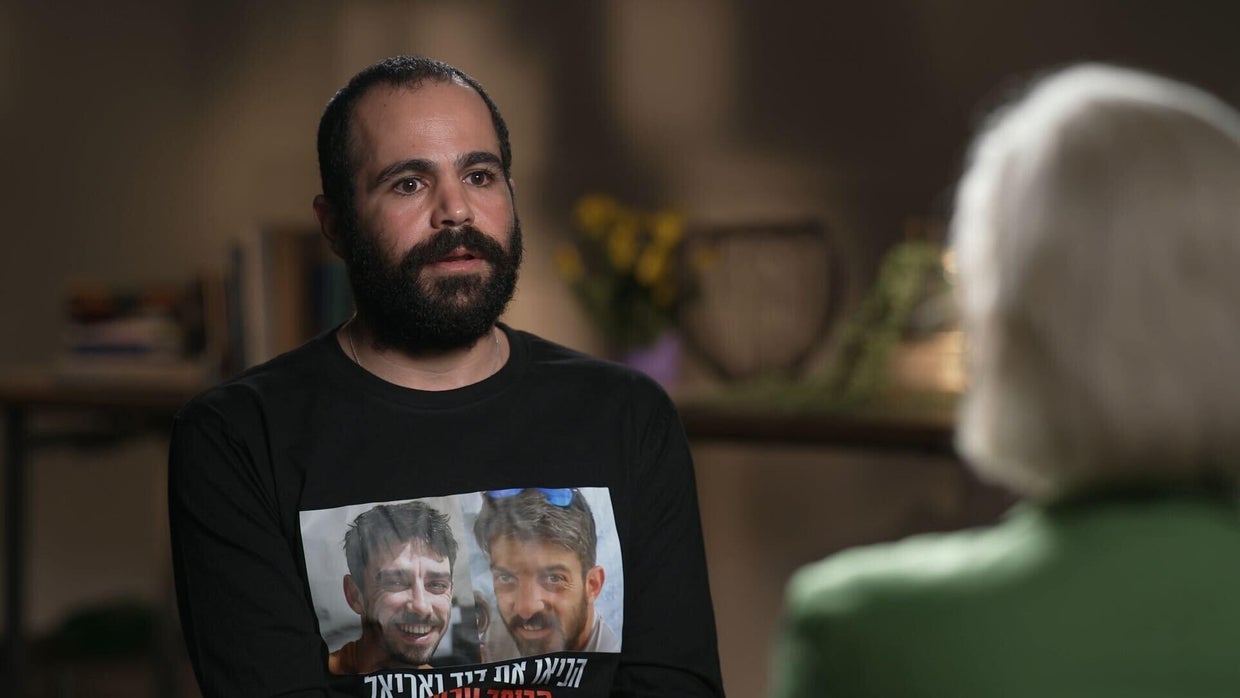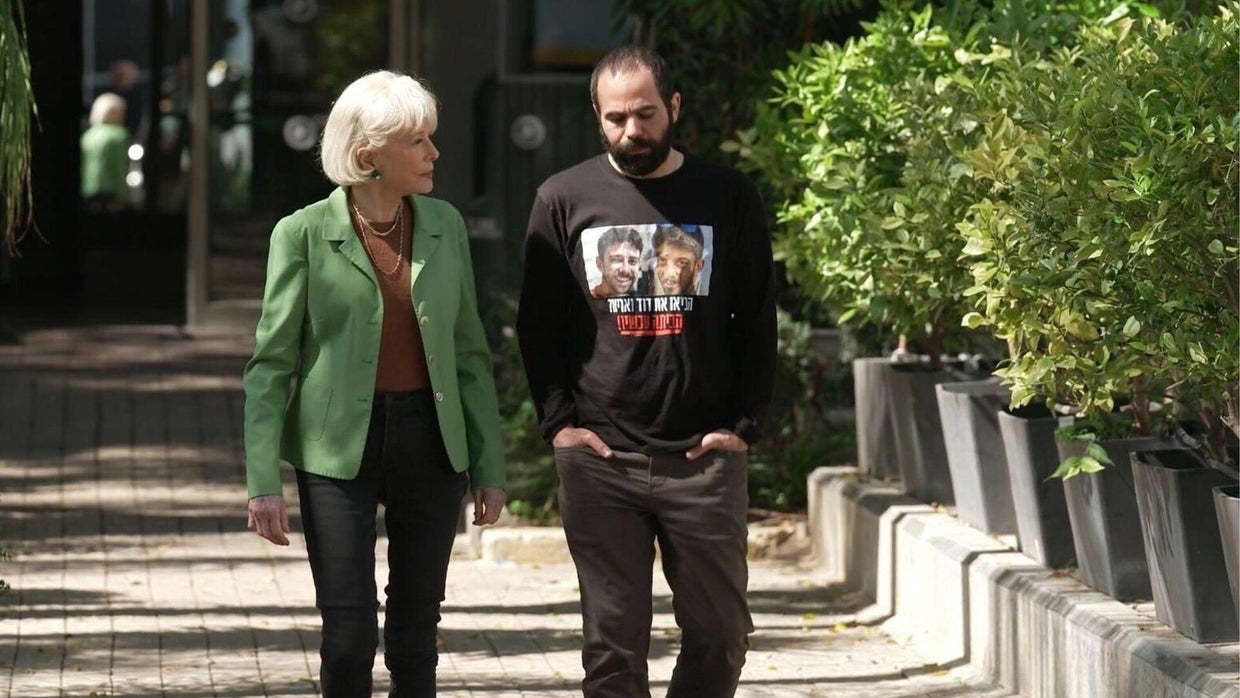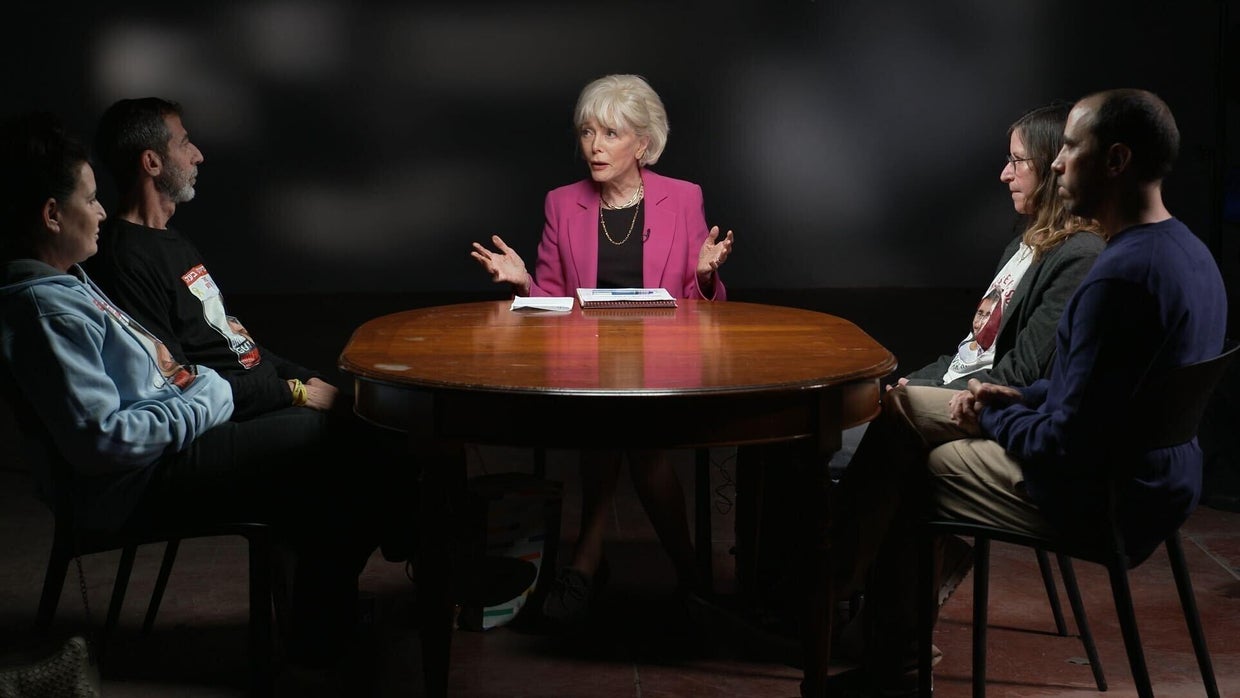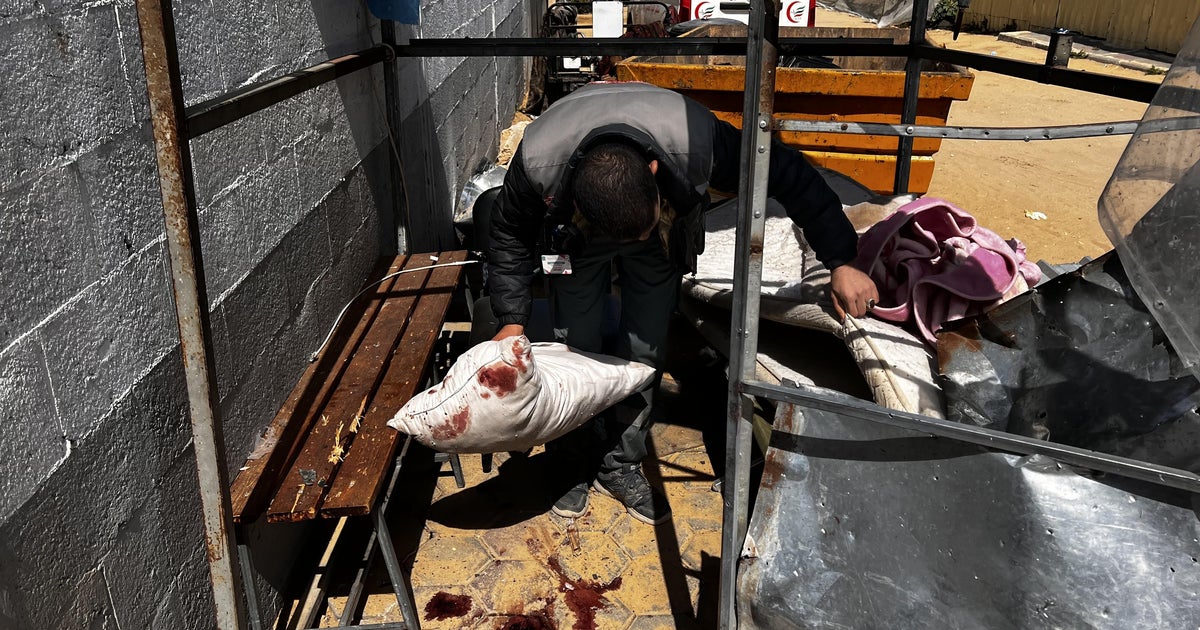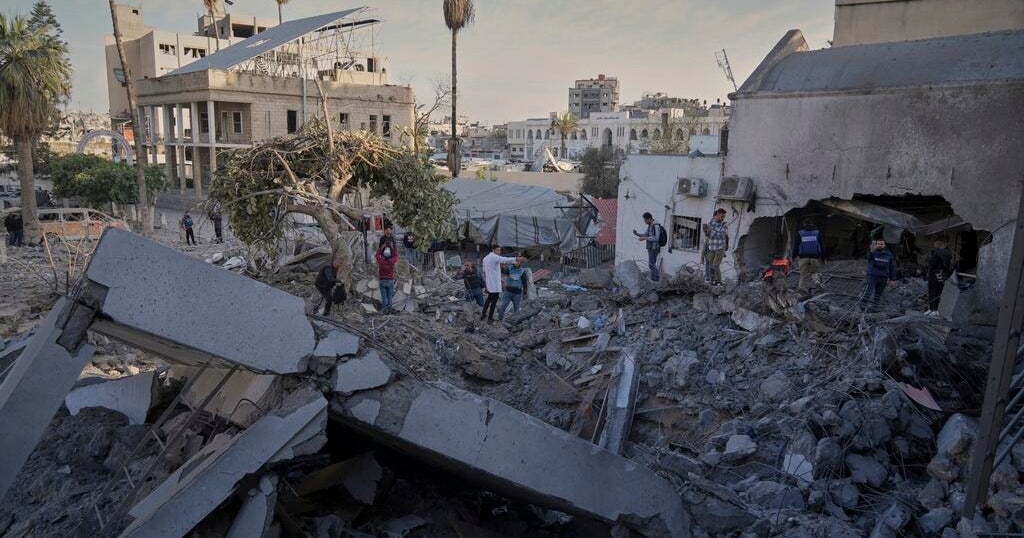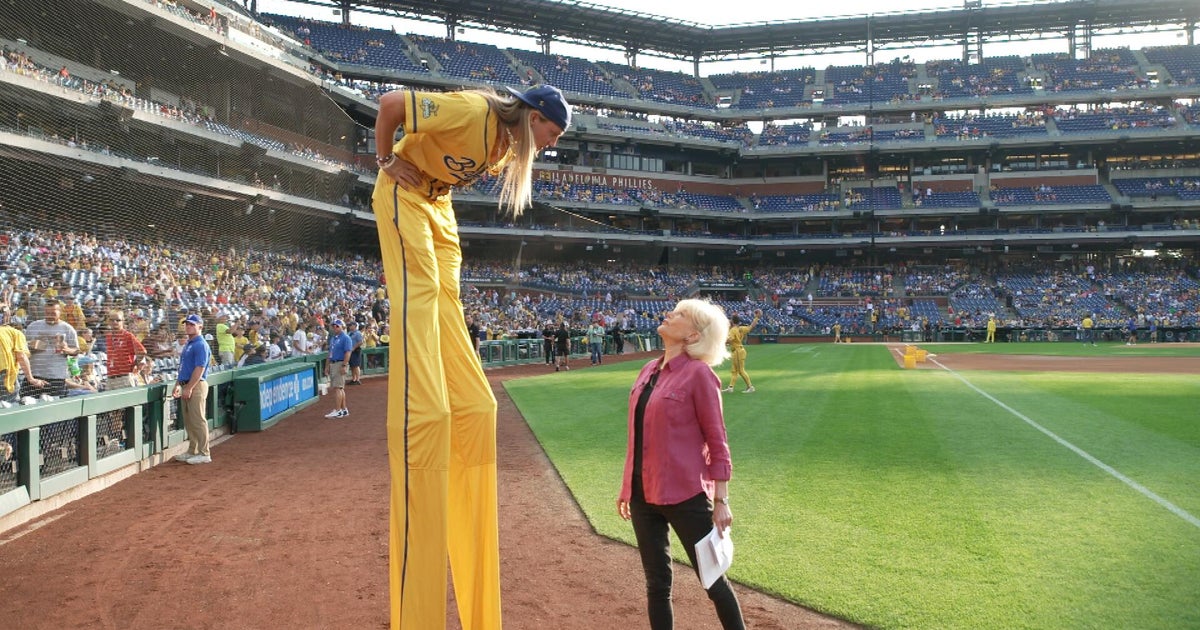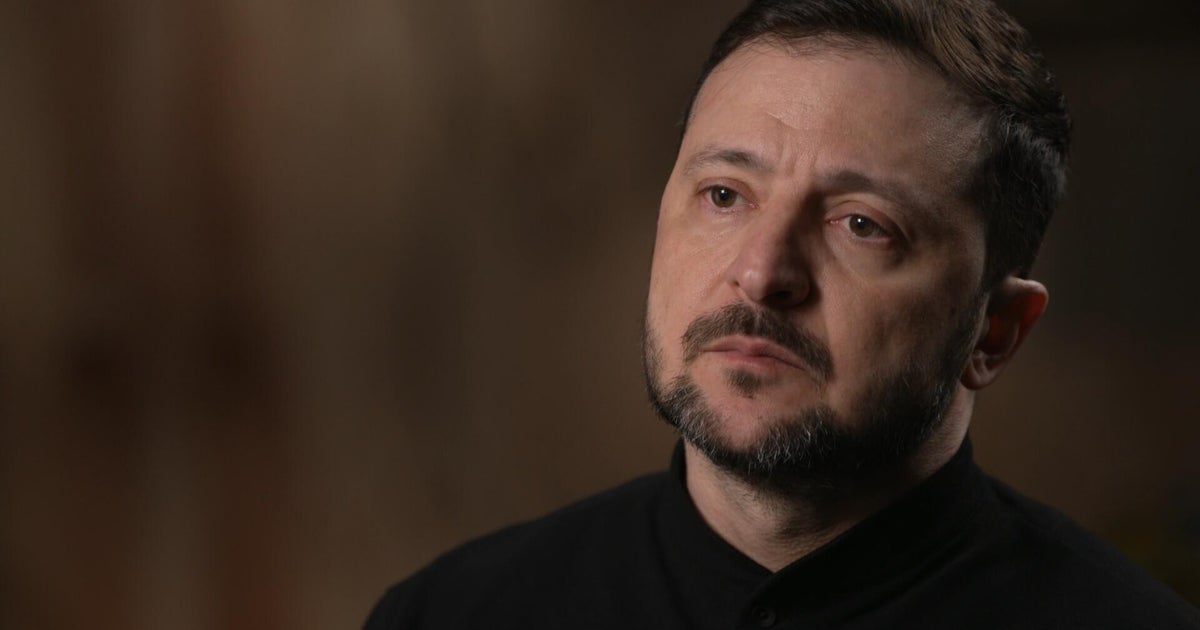Freed Israeli hostages campaign for new ceasefire with Hamas, call for return of captives from Gaza
Statistics tell the grim story of the October 7th, 2023 Hamas terrorist attack on Israel: 1,200 civilians and soldiers slaughtered that day, 251 taken hostage: men, women, and children. Since then, an estimated 50,000 Gazans have been killed.
Twelve days ago, Israeli Prime Minister Netanyahu resumed the bombing of Gaza, breaking a fragile ceasefire that was exceedingly popular with Israelis. Two dozen hostages came home alive in that ceasefire. Now, instead of quietly healing, many of them - frail, traumatized and in pain – are out campaigning for the release of all the 24 remaining hostages still believed to be alive, suffering in the Gaza tunnels. This weekend, new talks around a possible ceasefire have been reported that would include releasing a handful of them.
The anguish of Yarden Bibas – forced to sit on camera after he's told by Hamas that his wife and sons were blown up in an Israeli air raid, though he now knows that the boys were killed by their captors.
Yarden Bibas: They were murdered in cold blood, bare hands. They used to tell me-- "Oh, doesn't matter. You'll get a new wife. Get new kids. Better wife. Better kids."
Lesley Lesley Stahl: They said that to you?
Yarden Bibas: Yeah, many times. Many times.
His wife Shiri and two red headed sons, 4-year-old Ariel and 9-month-old Kfir, became the symbol of the horror of October 7 when they were kidnapped out of their home – while Yarden was driven off to Gaza on a motorcycle, swarmed and beaten by an angry mob.
He was released last month in a staged ceremony, sent home thanks to a ceasefire. The bodies of his wife and sons were returned later. Just four days after burying them, he made a public appeal.
Lesley Stahl: You wrote a letter to Prime Minister Netanyahu that was read aloud and it was really a plea to stop the fighting.
Yarden Bibas: Yeah, because we still have people there.
Lesley Stahl: But don't you think that the fighting will encourage them to release the hostages?
Yarden Bibas: No.
Lesley Stahl: No?
Yarden Bibas: No.
The fighting resumed despite a ceasefire agreement in place that would've eventually ended the war in exchange for all the remaining hostages. This is Bibas' first interview. He chose an American outlet, he said, so the White House would hear his message.
Lesley Stahl: If you could say something to President Trump, what would you say?
Yarden Bibas: Please stop-- stop this war and help-- help bring all the hostages back.
Lesley Stahl: And you think he can help?
Yarden Bibas: I know he can help. I'm here because of Trump. I'm here only because of him. I think he's the only one who can stop this war again.
Lesley Stahl: So you think he can bring about another ceasefire?
Yarden Bibas: He has to convince Netanyahu, convince Hamas. I think he can do it.
The lives of the hostages still there, Bibas says, are jeopardized every moment the bombing continues. And he knows.
Lesley Stahl: You were held mostly in the tunnels?
Yarden Bibas: Yeah.
Lesley Stahl: So when there was fighting going on, when the IDF was bombing, life got worse?
Yarden Bibas: It's scary. You don't know when it's gonna happen. And when it happens, you're afraid for your life. The whole earth would move like an earthquake, but under-- underground.
Lesley Stahl: Oh my God.
Yarden Bibas: So everything could collapse any moment.
Weighing on Bibas is that his best friend is still in Gaza. David Cunio was kidnapped with his wife, Sharon, and two kids. They came home; he did not.
Yarden Bibas: This is David. I know him from first grade. And this is his younger brother, Ariel.
Lesley Stahl: And they're both still in captivity?
Yarden Bibas: They're both still in captivity. And-- I don't know if they gave enough food, enough water. Especially now, when the war is back on.
Lesley Stahl: Tell us about the friendship.
Yarden Bibas: We did everything together. He was with me in every big thing in my life. He was in my wedding. And now I'm having the-- probably the-- the hardest thing I have to move with my life, and David is not with me. I lost my wife and kids. Sharon must not lose her husband.
Hours after the bombing resumed, Bibas stood in silent protest alongside another recently released hostage, Keith Siegel.
Keith, who's Israeli-American, and his wife Aviva, had gone to the White house to thank President Trump for their release.
President Trump: Take care of yourself, OK.
Lesley Stahl: This is your house?
Aviva Siegel: This is the house.
Keith Siegel: Yes.
They showed us where they were kidnapped: their old house in a kibbutz near the border with Gaza.
Aviva Siegel: I stood here. They forced me out of the window, and they pushed me outta the window while I had to go all the way there.
Lesley Stahl: Oh my God.
Aviva Siegel: I was in a shock. I was in a shock.
Keith Siegel: We were driven into Gaza and then taken into a tunnel -- feeling in danger, feeling life threatened, terrorists around us with weapons.
Lesley Stahl: Could you breathe? Was there enough oxygen, down there?
Keith Siegel: We were gasping for our breath.
Aviva was with her husband for 51 days – until she was released during a brief ceasefire in 2023. They were held with several women and children, and said there was constant abuse.
Keith Siegel: I witnessed a young woman who was being tortured by the terrorists. I mean literal, you know, torture, not just-- in the figurative sense.
Lesley Stahl: They made you watch it?
Keith Siegel: Yeah. I saw sexual assault with female hostages.
Keith says things got worse for him after Aviva was released and that early ceasefire collapsed.
Keith Siegel: The terrorists became very mean, and very cruel, and violent.
Lesley Stahl: More so?
Keith Siegel: Much more so. They were beating me and starving me.
Lesley Stahl: Do you think they starved you or they just didn't have food?
Keith Siegel: No, I think they starved me and they-- they would often eat in front of me and not--offer me food.
Lesley Stahl: Did they let you take showers?
Keith Siegel: Once a month. It was like a half a bucket of water with a cup to like pour over our body, cold water.
Lesley Stahl: I had heard that they shaved the men's heads and private parts.
Keith Siegel: Yes, this is true.
Lesley Stahl: Do you know why?
Keith Siegel: I think they thought it was maybe it amused them or, you know, humiliating. I felt humiliated.
Lesley Stahl: You told us that your spirit was broken.
Keith Siegel: Yes. I felt that I was completely dependent on the terrorists, that my life relied on them, whether they were gonna give me food--bring me water-- protect me from the mobs that would lynch me. I was left alone several times and I was very, very scared that maybe they won't come back and I'll be left there. And what do I do then?
Lesley Stahl: Oh my goodness.
Keith Siegel: What do I do then? So maybe that was a way for them to torture me in that way, in a psychological way-- make me think, "OK, should I escape? Should I not escape? Should I try to escape?" But I'm pretty sure they knew I wouldn't dare to do that because I needed them.
Back at their destroyed kibbutz, Aviva spoke of two neighbors still languishing in Gaza.
Aviva Siegel: There needs to be a deal that will bring them back, and finish with this whole thing.
Also still in gaza: best friends Guy Gilboa-Dalal and Evyatar David. Hamas kidnapped them from the Nova Music Festival, taking them deep into enemy territory. Recently released 40-year-old Tal Shoham spent 471 days with them in captivity.
Tal Shoham: After I met Guy and Evyatar-
He met their parents to tell them about their sons.
Lesley Stahl: There are families in situations like this now all over Israel, where released hostages are telling families the conditions of their children.
Ilan Dalal: Well, it's important for us to know exactly what's-- going on with our children.
Lesley Stahl: You're prepared, you think?
Galia David: Yeah. No. Maybe.
It's hard for anyone to be prepared, especially when it's your kids, and Tal didn't hold back, telling Guy's parents:
Tal Shoham: One moment he's, like, partying in the Nova, the second moment he's in the worst place in the world. And it's took him, I think, five or six days just to-- stop crying, to start to-- realize that-- this is the reality now.
Tal said they were mostly confined to a narrow tunnel like this, beaten every day and made to share minute amounts of pita, rice, and water.
Tal Shoham: Like sometimes the water tastes like blood, sometimes like iron. Sometimes it was so salty that you could not drink it, but you don't have anything else. You don't need too much to stay alive. You can eat only one bread every day, and if-- have-- like, 200 mL of water every day and you-- you will stay alive.
Lesley Stahl: You proved you could do it.
Tal Shoham: Yeah. The main guard, he actually said, "I can bring you this kind of amount of food and you will survive, and you will keep like that for five years. And you won't die, but you will-- will have, like, the worst time."
But they were resourceful, coming up with odd ways to win favors. For instance, they discovered one of the guards liked back rubs.
Tal Shoham: So we did exchange. The exchange was that he will get a massage every day and he will bring us some more food. And different food, like--
Lesley Stahl: You bartered.
Tal Shoham: --a can of meat. Yeah, exactly. A can of tuna or sardines.
Lesley Stahl: How are you listening to this?
Galia David: I want everyone to listen because this is the reality. Maybe someone will hear it and it will save our sons. I don't know.
Ilan Dalal: It's worse than how they treat animals.
Tal Shoham: One of the toughest things that I heard from them, they told me more than once that why to stay alive now? I mean, why just to not-- take their own life with their own hand and to finish it, I mean to get released from this.
Galia David: And they will (eigh)-- they will do it together if they decide to do it.
Tal Shoham: They are not children, but from-- from time to time I felt like a father and their rep-- sorry. [cries].
Ilan Dalal: They are children.
Tal Shoham: I really, really fear that they are now alone.
Tormenting them further, for the world to see, Hamas brought Guy and Evya in a van to watch fellow hostages leave, and beg for their own release.
Ilan Dalal: And then they moved them back to the tunnels. So this can be devastating to them.
Lesley Stahl: I don't know how you could watch that.
Galia David: It was a sign of life.
There's so much trauma.
Now home, Keith Siegel spends his time at vigils and protests, instead of quietly healing.
Lesley Stahl: So in a way you're still there.
Keith Siegel: Uh-huh (affirm).
Lesley Stahl: Your mind is still there.
Keith Siegel: It is, every day–
Lesley Stahl: Every day–
Keith Siegel: --most of the day.
Lesley Stahl: You're thinking about who's left behind.
Keith Siegel: Uh-huh.
He and the others are fighting for those left behind, while still in their own pain, feeling a sense of urgency and fear that time is running out.
Produced by Shachar Bar-On. Associate producers, Madeleine Carlisle and Jinsol Jung. Broadcast associate, Aria Een. Edited by Sean Kelly.

